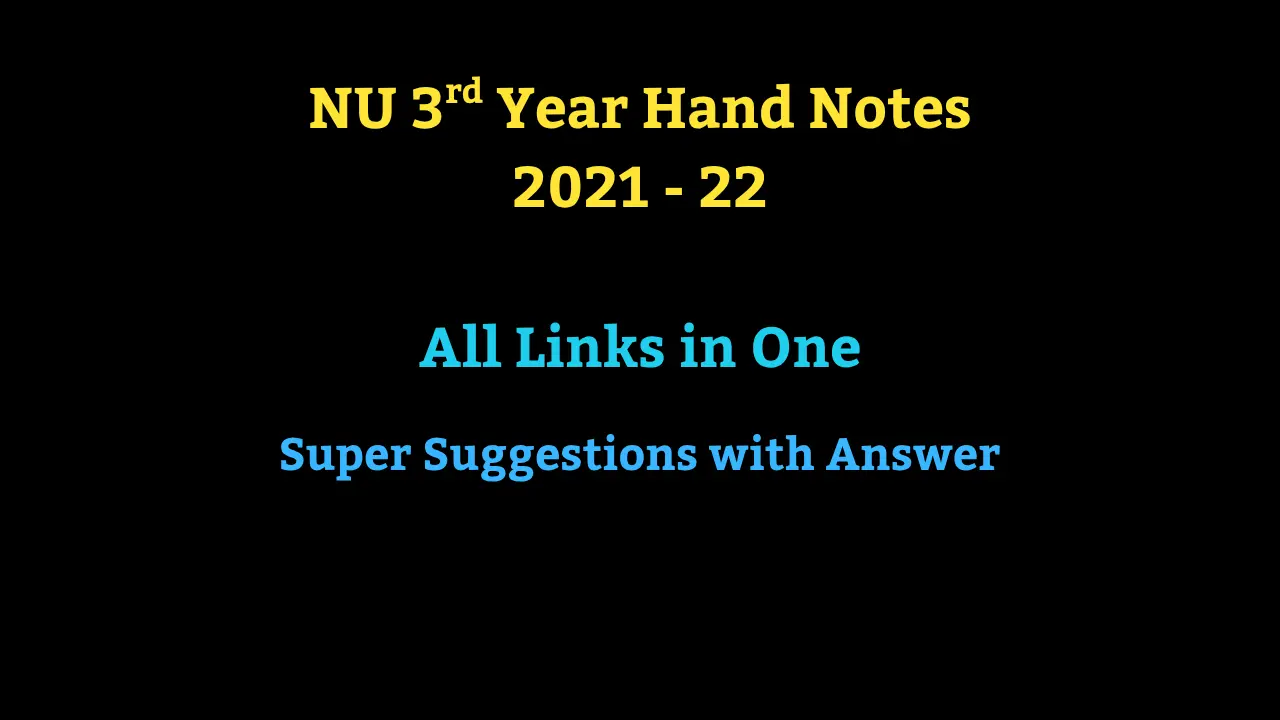
NU Masters Suggestions 2022-23 Chaucer Part -A Brief Questions in “The General Prologue to The Canterbury Tales” Brief question in “The Nun’s...Continue



NU Masters Suggestions 2022-23 Chaucer Part -A Brief Questions in “The General Prologue to The Canterbury Tales” Brief question in “The Nun’s...Continue

NU 4th Year Suggestions & Notes 2020 -21 Session: 2020-21 Exam: 2024 বিসমিল্লাহির রাহমানির রাহিম। যেহেতু এই বর্ষের পরীক্ষায় উত্তীর্ণ হয়ে অনেকেই...Continue

NU 3rd Year Suggestions and Notes 2021-22 Elizabethan and Jacobean Drama Part - C [N.B.: ২০২৪ সালে Volpone থেকে ১০০% ২টা Broad...Continue
Comment on the figures of speech used in the portion of the poem “Elegy Written in a Country Churchyard”. Thomas Gray’s (1716-71)...Continue
How are the mood and tone of the poem “Elegy Written in a Country Churchyard”? Thomas Gray’s (1716-71) “Elegy Written in a...Continue
What picture of village life do you find in the poem “Elegy Written in a Country Churchyard”? Thomas Gray’s (1716-71) “Elegy Written...Continue
Write the meaning of the following words in English: Molest, plod, lull, solemn, stillness, landscape, heap cell, turf, drowsy. Meanings of Words...Continue
Write the summary of the poem "London, 1802". William Wordsworth's (1770-1850) poem "London, 1802" (1807) is a heartfelt call to the past....Continue
Why does Wordsworth address John Milton specifically in the poem "London, 1802"? William Wordsworth's (1770-1850) poem "London, 1802" (1807) is a call...Continue
What does the metaphor "fen of stagnant waters" imply about England's condition during the time Wordsworth wrote this poem? William Wordsworth (1770-1850)...Continue
What virtues does Wordsworth plead for Milton to bring back to England? In the poem "London, 1802," (1807) William Wordsworth (1770-1850) calls...Continue
Discuss the significance of Wordsworth's description of Milton’s soul as like a star that "dwelt apart." William Wordsworth's (1770-1850) poem "London, 1802"...Continue
Analyze the poem "London, 1802" as a sonnet. "London, 1802" (1807) by William Wordsworth (1770-1850) is a beautiful sonnet that calls out...Continue
Write about the tone and Authors position in the poem "London, 1802". In the poem "London, 1802" (1807) by William Wordsworth (1770-1850), ...Continue
Evaluate the poem "London" as a lyric. "London" (1794) by William Blake (1757-1827) is a beautiful yet sad poem. It is like...Continue
What is the central theme of the poem, and how is it presented here? "London" (1794) by William Blake (1757-1827) is a...Continue
Comment on the author’s position and the tone of the poem "London". William Blake's (1757-1827) poem "London" (1794) paints a dark picture...Continue
What picture of the city life do you get from the poem "London"? "London" (1794) by William Blake (1757-1827) gives us a...Continue
Explain the following: “And mark in every face I meet Marks of weakness, marks of woe.” William Blake's (1757-1827) poem "London" (1794)...Continue
What is the tone of the poem "She Dwelt Among the Untrodden Ways"? The tone of "She Dwelt Among the Untrodden Ways"...Continue
What figures of speech used in the phrase “Marriage hearse”? What can be the possible interpretation of the phrase? William Blake's (1757-1827)...Continue
Write a summary of the poem "London". "London" (1794) is a powerful poem written by William Blake (1757-1827). It paints a vivid...Continue
What is Lullaby? What characteristics of Lullaby do you find in this poem? A lullaby is a gentle song. It helps babies...Continue
Evaluate the poem “Lullaby” as a lyric. Tennyson’s (1809-92) “Lullaby” (1847) is a gentle and touching poem. It feels like a soft...Continue
